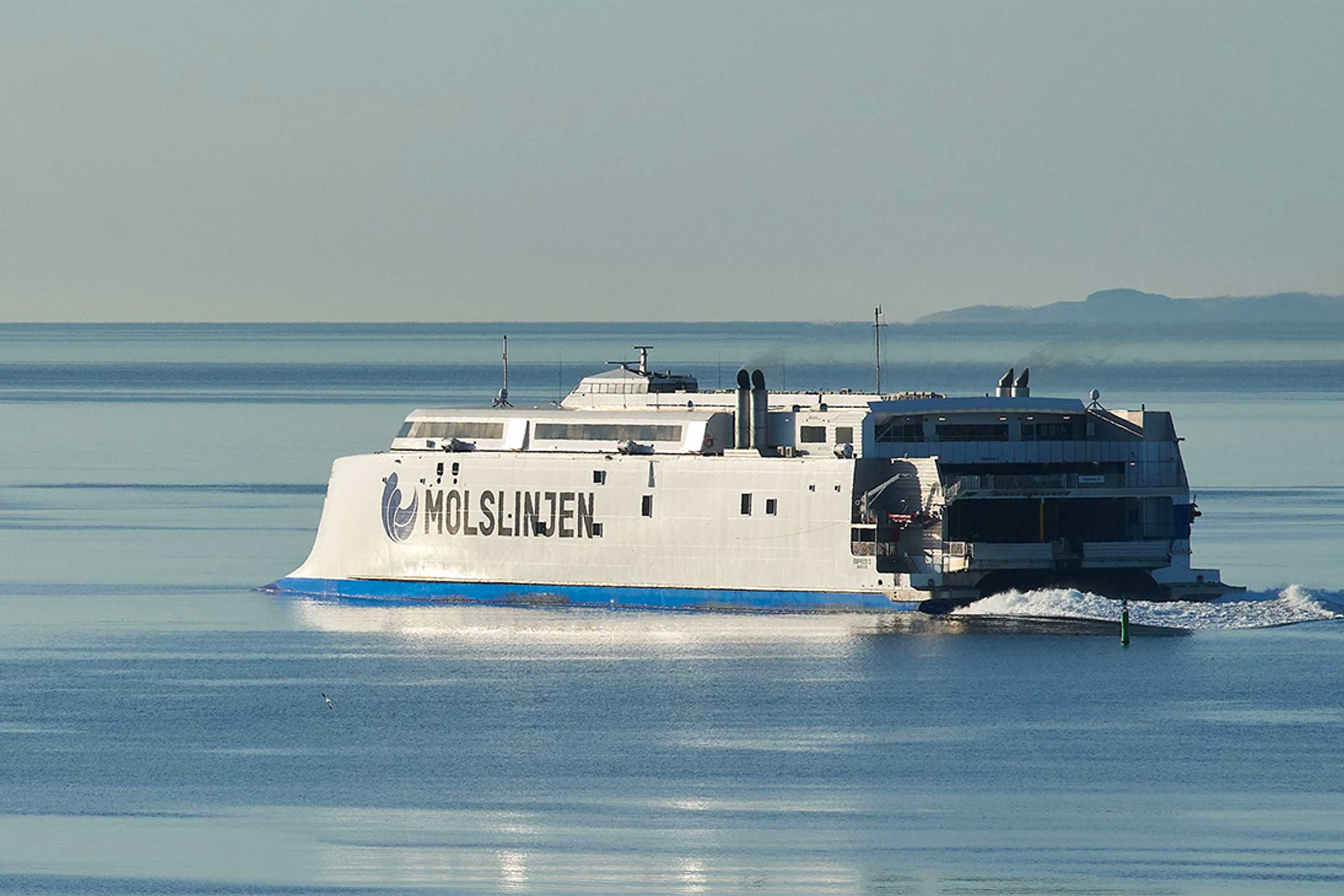With the marine industry’s focus increasingly on decarbonization and the need to comply with ever more stringent environmental legislation, Molslinjen’s strategy is centered around ensuring sustainable but cost-effective operations. In other words, lower emissions, fuel savings and reduced maintenance costs.
To achieve these objectives, Danish fast ferry operator Molslinjen decided that scheduled routine maintenance on its Express 1 ferry was the ideal opportunity to apply a turbocharger upgrade. However, they were faced with a dilemma: time.
The frequency of Express 1’s service on the busy commuter route between the Danish island of Bornholm and Ystad in Sweden meant that the ferry could not be taken out of service without serious disruption. The possible timeframe for any work to be carried out was just five hours at night while the vessel was docked. During this tight window, any work that needed to be done would have to be completed, checked, and tested before the following day’s operations commenced.
“The Express 1 ferry makes the 80-minute crossing as many as ten times a day. With this kind of frequency, an improvement in efficiency has a significant impact on the CO2 emissions and fuel costs. We decided, therefore, to consult with Accelleron about possibilities to improve overall engine operation by optimizing the turbocharger,” explained Bjarne Rasmussen, Chief Engineer at Molslinjen.
Creativity and collaboration
Everything involved careful study and planning. Finding the right solution to meet the customer’s requirements meant utilizing both creativity and collaboration.
Accelleron’s general strategy for turbocharger component upgrades is to combine the short implementation time of a standard service (no additional downtime compared to a standard service) with the improvement benefits its latest technological developments.
In this case, Accelleron proposed leveraging the developed component upgrade to create the optimal match with the engines’ output. By upgrading the eight ABB TPL65-A30 turbochargers, the achieved annual reduction of CO2 emission is equivalent to planting 35,000 new trees every single year and the fuel bill is reduced by almost 200,000 USD over the same period. The turbocharger upgrade also enabled lowering the thermal load thereby reducing wear and tear on both the engine and the turbocharger component, again with a positive impact on maintenance costs. Molslinjen’s investment simultaneously enabled enhanced competitiveness and reduced environmental impact of the fleet.
How was the upgrade integrated into the daily schedule? Jann Koch, Global Sales and Application Engineering Manager, Product Line Upgrades at Accelleron, explains: “We implemented the turbocharger upgrade during the night, while the vessel was out of service and took the measurements during regular operations without disturbing the schedule. This was only possible thanks to the commitment and hands on involvement of the vessel’s crew. The engines were certified and, through close coordination with the other parties, we achieved a successful conclusion. It was a true turnkey project, from initial investigation of the needs, to carrying out a well-planned upgrade, through to jointly arranging the certification work.”
« We implemented the turbocharger upgrade during the night, while the vessel was out of service and took the measurements during regular operations without disturbing the schedule »
Jann Koch, Global Sales and Application Engineering Manager, Product Line Upgrades at Accelleron
The first on-site integration trials exceeded expectations, and further optimization potential was identified. At the request of Molslinjen, Accelleron fine-tuned the turbochargers to achieve maximized engine performance and operational benefits.
The project was made possible thanks to fantastic support from Accelleron’s local unit, with Tauseef Kamal, Upgrade Manager Scandinavia, and Jann Koch, at Accelleron, working closely together with Molslinjen to make the upgrades a reality.
The certification process
In addition to the technical and scheduling challenges imposed by this project, there was also the need to certify the new set-up. International Maritime Organization (IMO) regulations require that a vessel’s engine meet the relevant emissions compliance and safety requirements. Approval is necessary if different components are introduced to the turbocharger – which was the case here.
DNV, the world’s largest classification society was contacted, and it was established that a turbo upgrade with a new performance-relevant component required a dedicated certification process.
Together, Accelleron and the customer coordinated the certification process under the direct supervision of a DNV representative. After evaluating the optimization benefits and taking the final nitrogen oxide (NOx) emission measurements, the approval was granted.
For Accelleron the project shows what can be achieved in a restricted timeframe, through detailed preparation and close collaboration with the customer and qualified partners. It also proves the value of combining standard maintenance with value-adding turbocharger upgrade solutions to maximize the customer benefits and provide a competitive advantage.
“I can only say that the component upgrade with cartridge is a great solution. We are profiting every day from the benefits it has enabled. It was all done while the ferry was in service, and it was tremendously well executed. A textbook example of what can be achieved with a great crew, dedicated know-how and well-planned execution,” added Molslinjen’s Rassmusen.














